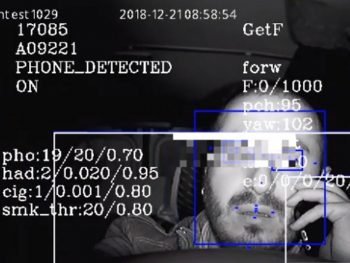Artificial intelligence is to reshape the telematics and vehicle camera sector, enhancing safety for fleets and all road users by clamping down on distracted and dangerous driving.

That’s according to telematics and vehicle CCTV supplier Centrad, which says it’s currently in the advanced stages of developing a range of AI camera products that can drive down accident rates – especially with regards to incidents caused by a lack of driver alertness.
It cites data estimating that between 10 and 20% of all road accidents are directly related to fatigue. Further statistics from the European Commission also suggest that between 10 and 30% of accidents are caused by distracted drivers.
But Geoff Cross, managing director of Centrad, says that by combining the deep learning capabilities of AI and succinct levels of accuracy with integrated CCTV vehicle systems, vehicle operators can enhance performance on the road by providing drivers with a predictive foresight of potential dangers as well as to maintain their alertness whilst on the road.
Cross commented: “Over the coming years there will certainly be a shift in the marketplace with regards to vehicle CCTV camera products on offer. Although the vehicle CCTV cameras will still play a significant role in providing real-time incident detection and deterrence, the use of AI with such products will greatly enhance their ability to proactively prevent accidents from occurring.
“This is particularly prevalent with driver-facing AI cameras, which are able to detect high-risk behaviours and alert both the driver and the fleet manager in the event of fatigue or distraction events.”
And the firm says the preventative element offered by AI is a vital component for ensuring driver safety, using event data to highlight ‘at-risk’ drivers for further action.
“Through being enhanced with AI, such products can therefore be used to effectively flag up incidents before they occur by detecting behaviours and facial cues, rather simply just reacting to accidents which is an issue with standard systems.”
This could have significant benefits for road safety across the board.
“As a former fleet operator, I have seen first-hand how easily negative behaviours such as becoming distracted or drowsiness can have on a driver’s ability to sufficiently operate a vehicle,” elaborated Cross.
“However, with the next level of vehicle safety technology available we have the power to prevent accidents and risky driving with not only will have a positive impact on the bottom line for fleet operators, but more importantly will vastly improve the safety of their drivers and other road users.”

